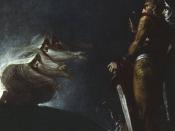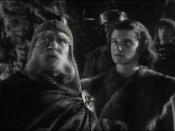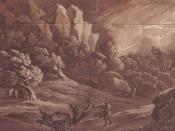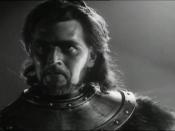Throughout this play, Macbeth journeys from a noble, loyal soldier to a power-hungry, deceptive monster, destroying any obstacle in his path. These obstacles are sometimes people, including the former King Duncan and his "friend" Banquo. Evil and greed take over his every thought, and in the process of destroying his obstacles, he never realizes that his own actions will lead to his downfall. Many quotes in this play prove this to be true. Throughout the play his attitude goes through drastic changes, and he ends up thinking he is indestructible.
At the novel's start, Duncan is the present king of Scotland. A nobleman by the name of Ross informs Duncan of the present Thane of Cawdor's deception and wrongdoing. He then tells Duncan about a brave soldier named Macbeth who fights for good. Duncan, angered by the news of the Thane, orders him to be executed, and for Macbeth to be pronounced Thane of Cawdor.
After his decision, Duncan thinks to himself, "No more the Thane of Cawdor shall decieve our bosom interestâ¦And with his former title greet Macbeth." (i, ii) This is very ironic. He is positive that he will not be deceived again, but as shown later in the story he is, but he suffers more greatly from Macbeth's deception.
Before hearing of this wonderful news, Macbeth speaks to three witches that predict he will be Thane of Cawdor and eventually king. Obviously, in disbelief he leaves, not yet knowing that he has earned the title. He then meets with a man who tells him this. When meeting with the king he is quoted as saying, "The service and the loyalty I woe, In doing it, pays itself. Your highness' part Is to receive our duties: and our duties Are to your throne and state, children and servants; Which do but what they should, by doing every thing Safe toward your love and honour." (i, iv) This quote shows Macbeth's honor and appreciation for his king and his country.
Macbeth then learns that the king with be coming to visit him at his castle, Inverness. He writes a letter to his wife, telling her of the witches' predictions and of the king's upcoming visit. Right away evil thoughts come to her mind. She begins to plan his death and how Macbeth will then rise to the top and be king. She so desperately wants her husband to be king. She says, "O, never shall that morrow seeâ¦look like th' innocent flower, but be the serpent under'tâ¦" This is when she starts to fill Macbeth's head of such evil ideas. She persuades him so much, questioning his manliness and strength that he eventually kills Duncan while he is asleep. Duncan's sons, afraid that they are sought after as well, flee the country, and Macbeth is pronounced king of Scotland.
Macbeth becomes very paranoid as the play continues. He is so afraid of someone finding out about Duncan's murder. He eventually decides that the only man he knows that is smart enough to figure this out is his "friend" Banquo. So, he decides that he must rid of him and his son Fleance who is predicted to one day be king. He sends three murderers to kill them on their way to Macbeth's castle. The murderers are somewhat successful. They kill Banquo, but Fleance escapes. Macbeth worries no longer. This is very ironic that he sends someone to kill Banquo after earlier in the play he introduces himself to Banquo, upon knocking, as "a friend" (II, i).
Macbeth starts to hallucinate about the ghosts of the men he has murdered. He goes to the witches to learn more about his future and they satisfy his wishes. They show him three apparitions, each with a message. The first apparition is a head wearing armor warning Macbeth to beware Macduff. The second apparition is a bloody child which gives the message "none of woman born shall harm Macbeth" (IV, i). The third apparition is a crowned child holding a branch that warns Macbeth he will see his downfall when Birnam wood comes Dunsinane. Macbeth insists on knowing more, but that is all the information they will give him. He leaves believing that none of this will ever come true, he believes that nothing can pose a threat to him.
In the final act of this play, Macbeth meets his downfall. He learns Macduff has fled to England to help Malcolm raise an army to defeat him. Out of revenge, Macbeth has Macduff's family and servants murdered. This gives Macduff the momentum to act, and kill the defiant Macbeth. He has broken the trust and the boundaries of good as Macduff sees it, and no longer will he let this happen.
When Macduff and his army are leaving Birnam Woo, very close to Dunsinane, he tells them to use branches as camouflage. They carry these sticks out, and literally part of Birnam Wood is coming to Dunsinane. As the witches predicted this means Macbeth's downfall is near. Suddenly Lady Macbeth commits suicide and Macbeth is warned that the army comes for him. He puts on armor, ready to fight until the end. He kills a man born of woman, and then faces Macduff. He believes his is indestructible, because no man born of woman can hurt him. He soon finds out that Macduff's mother died before his birth and was born by C-section. Macduff defeats Macbeth, as the apparition predicted, and beheads him. He brings the armored head to Malcolm who is announced king of Scotland.
Macbeth is a noble man. He is good and honest. He fights hard for his country and was loyal to his king. Eventually, though, greed and the need for power overtake his every though and action. He becomes a machine, destroying any obstacle in his path. This leads to his downfall. He gets in return what he gave to his country, disloyalty, dishonor, and defeat. He dies, known as an evil king, defeated by good, dying with a bad name.
Mac Beth is the only source of information on this paper!





